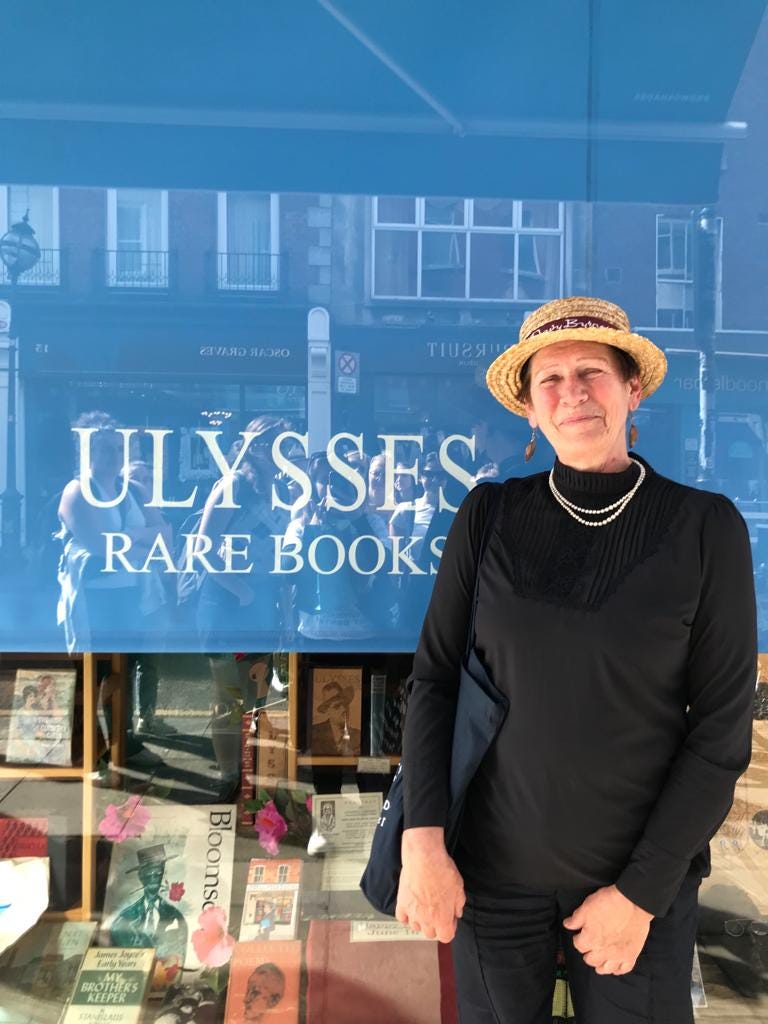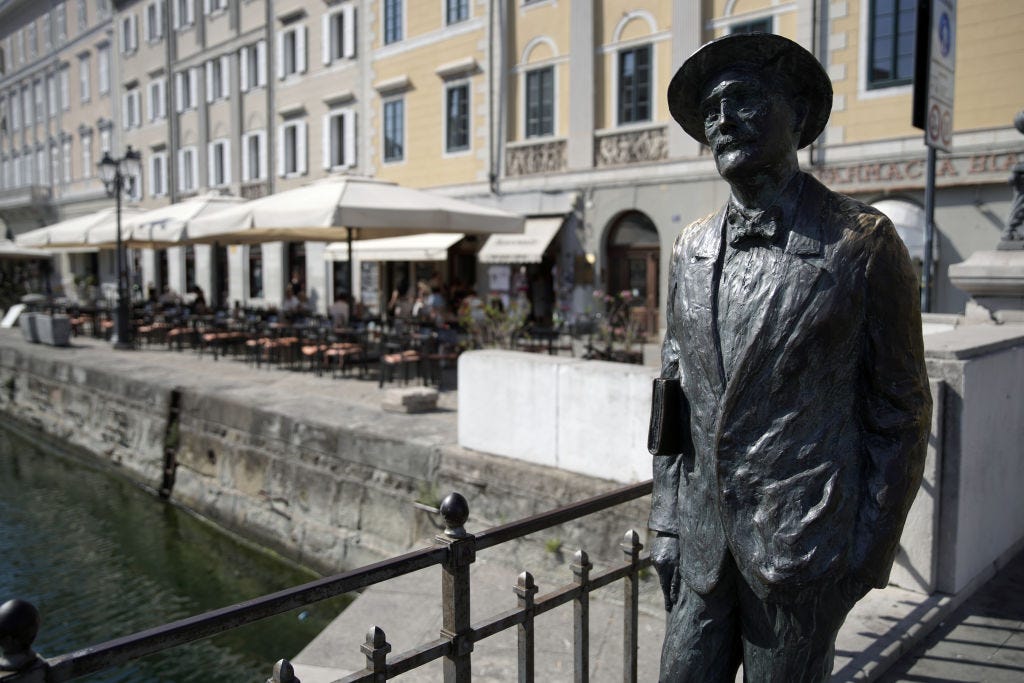"Ulysses is not a hard read if you concentrate on the food."
Ahead of Bloomdsay, Tripe + Drisheen interviewed Dr. Flicka Small about how she got started on Joyce, the writer's connection to Cork, and a misplaced plaque on Anglesea Street.
On the face of it, Bloomsday is a Dublin event. It’s that one day in the year when Ulysses enthusiasts get to cosplay with glee on the streets of the capital. However, Bloomsday, a celebration of Joyce's complex masterpiece written over 100 years ago, takes place wherever Joyce fans reside. And that includes Cork (and James Joyce was half Cork!).
Dr. Flicka Small, a Joycean with a capital "J," has read the Dubliner’s work widely and deeply. She’s also produced “James Joyce: Framed in Cork”, a short film about Joyce’s Cork roots. A trained chef, Flicka alerted me to the fact that Joyce mentions drisheens twice in his work. In fact, her culinary background has provided Flicka with a unique approach to Joyce’s work. This weekend, she’ll be staging a Bloomsday Festival in Cork over two days where all things Joyce will be celebrated.
T+D: When people think of Bloomsday, they probably think of Dublin, which is, after all, where Ulysses is set. That said, Bloomsday is also celebrated around the world. What’s the Cork connection?
Flicka Small: James Joyce’s father was born in Cork. His father’s father was a salt and lime merchant from Fermoy who settled in Anglesea Street and married Ellen O’Connell whose family had a drapery business on Washington St. Their only son, John Stanislaus Joyce, was James Joyce’s father.
T+D: Can you explain a little how Bloomsday got started?
FS: The original Bloomsday was in the 60s in Dublin. Anthony Cronin and a few other literary types decided to follow the route taken in Ulysses but they got pretty drunk along the route. As far as I can find out, there has only been one Bloomsday in Cork and that was 40 years ago, 100 years after James Joyce’s birth.
T+D: Is Bloomsday a kind of cosplay for Ulysses fans (stans)? Will you be dressing up?
FS: In Dublin it’s mad! Everyone dresses up whether they’ve heard of James Joyce or not!! It’s wonderful actually and brings in a lot of visitors from America and across the world. The streets are thronged with people in Edwardian dress and the pubs are full of people quoting from Joyce. I don’t tend to do the dressing up thing – and I like to be in Dublin if there is also the International James Joyce Conference happening at the same time, which is about every four years.
T+D: Like many people I started Ulysses, but have yet to finish it. (It’s me, not Joyce). However, there are Cork references in Ulysses. And, as is well documented by you and others, James Joyce is the son of a Cork man. How familiar would Joyce have been with Cork, and what was the relationship between father and son like?
FS: Not only references in Ulysses, but Finnegans Wake, and a whole 18 pages of Portrait of the Artist are dedicated to a trip to Cork, when John Stanislaus had to sell all their property, having drunk it away in Dublin.
The young James Joyce accompanied him, and Cork left a lasting impression on him. John Stanislaus treated his eldest son, James, like an only son and he was his favorite. He passed onto him all his stories about Cork and all his escapades. The Wake could probably not have been written without the father! The father/son relationship was complicated …. James Joyce is said to have spoken with a Cork accent even though he never lived there and this can be heard on some old recordings. And what other author has mentioned Drisheens in two of his novels?
T+D: Is it true that there’s a plaque on the footpath on Anglesea Street commemorating where John Joyce was born, but it’s in the wrong place?
FS: Yes!! That is true! If you want to know more, you’ll have to join us on Saturday evening. We are going to have a “shindy” in the house where John Stanislaus actually lived.
T+D: You have, if you don’t mind me saying it, an esoteric interest in Joyce’s literature as your academic career is focused on the semiotics of food in his work. Can you tell readers what this means and also if modern day critics describe Joyce as a “foodie”? And how do you think he would take to that description?
FS: That sounds very pretentious, but it just really means that food is more than just food and that we are literally what we eat. Having worked as a chef for most of my life, the food in Ulysses just jumps out at me, so when I had the opportunity, I decided to go to university and study for a MA so that I could eventually write in a more meaningful way about the food in Joyce’s work – I didn’t want to just produce a “coffee table book” of photographs.
Joyce definitely liked his food – if he had money he would take his whole family out to a restaurant to eat, from a very early age. In his letters he lists the food he would like to eat, or the food he has just bought. He understands the importance of food – and the lack of it. Joyce would probably embrace any label that was self-promoting.
T+D: What age did you start reading Ulysses? Did you like it from the get go? What are the stand out passages for you?
FS: I did my A levels in an Irish convent in England and we studied Portrait, so I was about 16 years old, and the passages on hell fire and everlasting damnation never left me! I just continued reading Joyce from then onwards. I probably read Dubliners after that and eventually Ulysses, but it’s not a hard read if you concentrate on the food.
T+D: There are hundreds and thousands of novels, as there are films, as there are paintings, but Ulysses has stood the test of time (how many other novels are celebrated in style with an annual event?) Why do you think that is?
FS: It sounds cliched now (a hundred years later), but he really was a genius. He might not have been a very nice man in some respects, but I don’t think it can be ignored how much he changed the face of modern literature – everything he did with the written word was innovative. And he was very perceptive – many of the things he wrote then about medicine, gender or politics, for instance, are only just being recognised today.
T+D: What’s happening in Cork on Bloomsday 2023? What are you looking forward to?
FS: Lots – and everything! Cork Bloomsday 23 will run over two days. The really big event is on Friday 16 June at 7pm. UCC Book Club and UCC and Crosshaven Choir have put together a wonderful evening of songs and readings from Joyce’s work, UnCork Joyce, and it is going to be performed in the old anatomy building at UCC where John Stanislaus Joyce studied medicine. But during the day there will be pop up events in the city.
From 4 – 6pm there will be an open mic and readings from Ulysses in Waterstones Bookshop and at 5pm there will be music with Ruti Lachs and the Fresh Air Collective in the City Library. I’m really looking forward to Saturday 17t– we will be in Nano Nagle Place all day from 10am to 5pm discussing the Cork/Joyce connection. Joyceans and South Parishioners will come together to pool their knowledge. Authors William Wall and Mary Morrissy will also read from their forthcoming Joyce-connected novels.
T+D: What was the best Bloomsday event you ever attended? Where was it?
FS: It’s not exactly a Bloomsday Event, but every year, one week after Bloomsday, the Trieste Summer School is held in Trieste, in the north of Italy. Joyce lived in Trieste for nearly 20 years, this was his home, and the influence of the location can be seen in Ulysses. Otherwise, I think it has to be a small event in my own house in 2002 – I cooked all the food from Ulysses, including the kidneys faintly scented with urine, and I asked all my guests to sing or perform. We had a piano in those days, and it was a glorious sunny day and the music wafted out across the garden.
T+D: Is it true that Joyce once remarked Cork was dreary? Was he stuck waiting for a bus on St. Patrick’s Street on a wet and miserable day? And the bus never came:) Or what was the context?
FS: What Joyce actually wrote, in a letter to his brother, was “for five rainy, dreary hours we were mooning about Cork”. Joyce opened the first commercial cinema in Dublin called the Volta and he came to Cork, thinking about opening one here too. It rained, he was missing home, he left again.
T+D. What do you think Joyce would make of Bloomsday? Would he be as they say in Cork “morto” or to use a more contemporary reference he’d lean into it?
FS: He might make a snide comment, but I think privately he would have been both amused and pleased. Don’t forget, Leopold Bloom was an advertising canvasser and valued the art of good advertising techniques.
Flicka is organising a one-day Bloomsday conference on Saturday, June 17 at Nano Nagle Place which will feature talks, lectures and discussions about all things Joyce. You can esgister for attendance here.
Time, date, place: 9am - 5pm, Saturday, June 17, Nano Nagle Place.
Fresh Air Collective will be playing some of Ruti Lachs compistions – including My Yiddishe Molly and The Cork Freilach – in Cork City Library as part of the the Bloomsday festival.
Time, date, place: 5pm, Friday June 16, Cork City Library.
With The Four Faced Liar, Cork has a new literary journal
‘Under the Four-Faced Liar it‘a 3 am…The iron tongue of Shandon Steeple is silent now and the great clocks on its four faces merely click and cluck and grumble as they haggle amongst themselves.’ - The Four-Faced Liar (2020) Ger Fitzgibbon, from the editorial pages of The Four Faced Liar.







